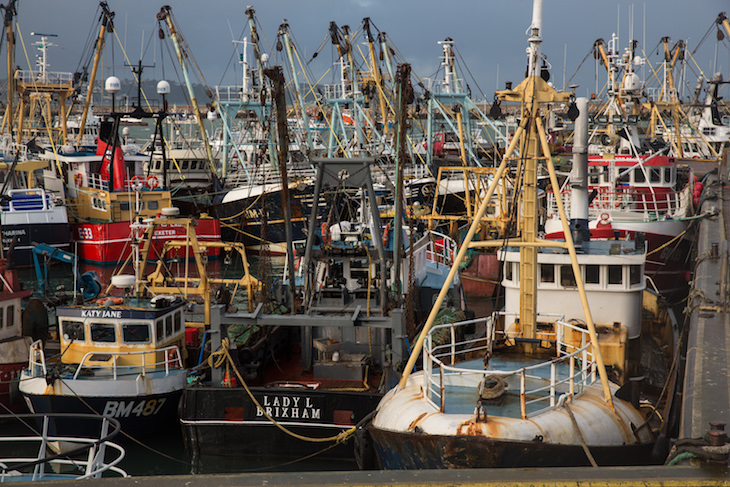My decision to vote Remain was driven in part by an exercise in which I tried to identify anyone close to me in Yorkshire — family, neighbour, business owner, farmer — who was worse off as a result of UK membership of the EU. The only people uncontestably in that category, I concluded, were the east-coast fishermen whose livelihoods have been eroded by 45 years of punitive quotas and unfair competition. So I felt for them on Monday, when their interests were traded away yet again as part of the Brexit ‘transition’.
Instead of being released from the Common Fisheries Policy in March 2019, as Environment Secretary Michael Gove proclaimed barely a week ago, our diminished fleet is stuck with the status quo until the end of 2020. Worse, the reversal represented by Monday’s ‘breakthrough’ deal was a blunt reminder that prospects for a happier fishing future look as poor as they ever did.
The problem in a cockleshell is that we simply don’t eat what we catch, or catch what we eat. A high proportion of fish and seafood from British boats is exported to the EU, while much of the cod and haddock we like to eat is imported from Nordic countries. So we seriously need tariff-free trade, for which the negotiating price demanded will be — guess what — continuing quota and access agreements that look very like the present regime. If that was always going to be so, what campaign slogan was emptier than ‘taking back control of our waters’?
Skiing for a better NHS
To Méribel in the Alps for the Coeur Blanc, a biennial charity event that bears no resemblance to the Presidents Club dinner — and for which I edit a souvenir magazine. While I lunched long at the Bistrot de l’Orée (‘More restaurant tips please,’ chorused readers I met during the weekend), fitter skiers completed a challenge that raised more than £250,000 for a medical cause called ‘MyC’. The arduousness of their trek — 70km downhill in falling snow and blank visibility — offered a metaphor for the obstacles facing a project that could bring new efficiency to the NHS by revolutionising heart-attack diagnosis.
In brief, Professor Mike Marber of St Thomas’ Hospital and King’s College London aims to perfect a hand-held device that will immediately indicate whether an A&E patient with chest pain has actually had a heart attack or can be given a ‘rule-out’ diagnosis and sent home. It would do so by testing for Myosin-Binding Protein C (‘MyC’), a ‘biomarker’ present in damaged heart muscle which Marber believes could give more accurate results on the ‘rule-out’ side than currently favoured tests for another protein, troponin. The Coeur Blanc’s money (including match-funding from King’s College) will help perfect the prototype.
The big win for the NHS, if the device works, will be the release of millions of hours of A&E resources as a result of swifter ‘rule-out’ decisions. So why — I asked — isn’t the NHS funding MyC to the hilt? The answer is that its budgets can’t possibly meet all the competing research calls, and the most viable path beyond ‘proof of concept’ is via venture capital to commercialisation by a giant diagnostics company such as Siemens of Germany, Roche of Switzerland or Abbott of the US. Marber, boosted by our charitable effort, now has a stronger chance of finding that path.
I wonder how many other brilliant pieces of laboratory work are out there waiting to transform the NHS, if only they could see the piste ahead.
Disruptors, please
If MyC was a company it could be a candidate for The Spectator’s Economic Disruptor of the Year awards, launched last week with the private bank Julius Baer.
You can find the entry form on The Spectator’s website, but if you admire an entrepreneurial business that has benefited consumers through radical innovation and is capable of achieving national or international scale, don’t hesitate to send me the name (martin@spectator.co.uk).
Retiring titans
Even the most enduring, adrenaline-pumped business titans must eventually settle for a comfy chair in the conservatory. Rupert Murdoch, 87 a fortnight ago, has shrunk his media empire by selling most of 21st Century Fox to Disney, leaving his elder son Lachlan as unchallenged heir to the remaining newspaper and Fox News interests. Now Li Ka-Shing, Hong Kong’s veteran dealmaker, who will be 90 in July, is handing the reins of his $100 billion Cheung Kong conglomerate to his elder son Victor.
K.S. Li was a migrant from mainland China who started out manufacturing plastic flowers, made a fortune in Hong Kong real estate in the last phase of British rule, established powerful connections with Beijing and went on to build a portfolio of utility, retail and telecoms businesses around the world. His UK assets range from Felixstowe port to the Superdrug chain. Last of a generation of Hong Kong oligarchs now being eclipsed by high-rolling mainlanders, he’s still a hero to the Wanchai taxi driver. Hence this week’s South China Morning Post: ‘Superman hangs up his cape.’
Neither Murdoch nor Li would ever have been called ardent Anglophiles, but for both the UK was a natural place to do business. For their elder sons, however — educated respectively at Princeton and Stanford — the US is the obvious destination for future investment, so for better or worse we’ll see less of both dynasties over here.
As for Victor Li, by the way, he’s a lucky heir in more ways than one. In 1996 he was kidnapped by a gangster called ‘Big Spender’ Cheung, who presented himself at Li senior’s doorstep and demanded HK$2 billion (£180 million) in ransom. Li calmly paid over the HK$1 billion of cash he had handy and offered to go to the bank for more. But Cheung released Victor — and later rang Li to ask for investment advice.
For more information on The Economic Disruptor of the Year Awards visit spectator.co.uk/disruptor







Comments